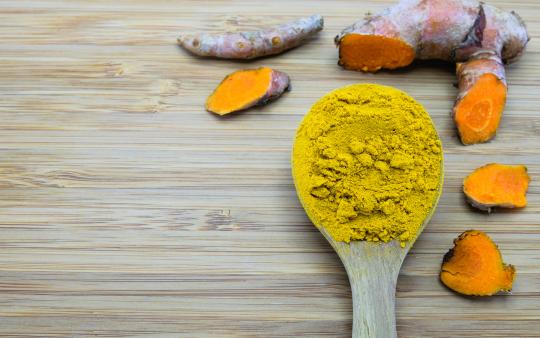Golden lattes are now practically a mainstay in quality coffee and tea houses, and with good reason: the star of the show, yellow-hued turmeric, contains anti-inflammatory and antioxidant curcumin. Touted as a treatment for everything from skin conditions, pain, headaches, and migraines, to digestive concerns, food sensitivities, and menstrual complaints, curcumin may also be beneficial for those with high cholesterol, depression, or diabetes! Not bad for a tasty spice!
Same but Different
The terms “turmeric” (Curcuma longa) and “curcumin” are often used interchangeably but it’s important to note that while both are derived from the same plant, turmeric is the popular earthy root that's used in many Indian and Southeast Asian dishes, giving curry powder (the spice mix North Americans are familiar with) its rich orange-yellow colour, and curcumin is the isolated active constituent in turmeric.
Curcumin is one of very few nutraceuticals (a food that has medical or health benefits) with such a broad application to various health conditions. This anti-inflammatory and antioxidant powerhouse has long been used in both Ayurvedic and Traditional Chinese Medicine (TCM) for improving digestion, decreasing pain, and treating liver disease, diabetes, atherosclerosis, gastrointestinal conditions, and osteoarthritis!
We’re just beginning to catch up with what has been known in Asian countries for centuries and newer research has shown curcumin’s ability to do even more than previously believed! It has demonstrated promise in being able to turn off genes related to cancer cell growth and increase apoptosis (cell death) of cancer cells, making it a potential anti-cancer supplement. Further, curcumin’s lipophilicity (capacity to be dissolved in fats) means that it’s able to cross the blood-brain barrier and has shown some evidence of benefitting cognitive function and memory. In fact, a systemic review demonstrated that curcumin supplementation for eight to twelve weeks increased the protein brain-derived neurotrophic factor (BDNF), a decline of which is associated with neurodegenerative disorders such as Alzheimer's, Parkinson's, Huntington's and multiple sclerosis.
Seasonal Seasoning
In TCM, turmeric’s warming and bitter qualities are great to consume during colder months to support the stomach and spleen. Studies have also shown that one way to naturally enhance curcumin’s bioavailability is by taking it with food, so sprinkle and sip your way through winter!
Absorption Aggravation
Before you start popping turmeric or drinking golden lattes all day long, there’s a lesser known downside: curcumin is both poorly absorbed by, and rapidly eliminated from, the body. This means that all your best efforts at increasing turmeric in your diet may not be giving you the curcumin boost you were hoping for. Because of curcumin’s poor bioavailability, dosing and product selection can be a daunting task. Typical dosing can range anywhere from 30 milligrams to 500 milligrams of turmeric per capsule (often taken one to three times a day), with a variable curcumin concentration depending on the formulation. This means that taking a 50 milligram turmeric supplement doesn’t necessarily mean you’re getting twice as much curcumin as taking one that contains only 25 milligrams. So what’s a curcumin consumer to do? The good news is that there are current formulations on the market that have added different (proprietary) compounds to help increase absorption and bioavailability in the body. Discussing the dosage, brand, and form that best suits your condition with your naturopathic doctor is the best way to get the most out of curcumin.
Curcumin Caution
Curcumin has a blood thinning effect at high doses, may increase bile secretion, and should be avoided if you are taking certain medications like NSAIDs, antiplatelet, anticoagulant, or chemotherapy drugs. And at the time of writing, there is not enough data to support the safe use of supplemental grade turmeric during pregnancy, but is likely be safe as a culinary herb. As always, speak to your healthcare provider before embarking on any new supplement program.
You may also enjoy: Curcumin is an Antioxidant, Free-Radical Fighting Superstar, DIY Immunity Wellness Booster, and Treating Injuries with Natural Remedies.









